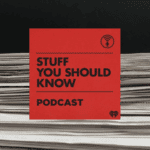“Asking for It” Wants Honesty about Queer Domestic Violence

In February 2020, videographer and musician Drew Denny with the audio production house Mermaid Palace and in partnership with the CBC, dropped her first podcast Asking For It, a seven-part series that grapples with fervor and grace the complex subject of domestic violence (also referred to here as intimate partner violence) in queer relationships and its effect on all areas of life.
Apple Podcasts | Google Podcasts | Podcast Addict | Stitcher | Website | RSS
At the surface level, Denny’s story is a modern semi-autobiographical reframing of the fable of Goldilocks and the Three Bears, about the life of Goldie (Drew Denny), an aspiring musician and runaway teenager throughout her romantic life as it becomes abusive, toxic, and a seemingly unbreakable cycle. Asking For It is an uncomfortably personal journey, and a representation of an oppressive elephantine issue that lurks in the shadows: the silence regarding domestic violence in queer relationships is a hundredfold that found in straight relationships, and we will not be able to address the problem until we start talking about it.
“I know we need to talk, but I don’t want to bring up anything complicated.”
I am twenty-three, and I am at a friend’s Halloween party that’s mostly people I don’t know, wearing a dress that hadn’t seen the light of day in a year, and there’s this punk lesbian, Maria, who has arrived with another girl dressed as a glittering fairy.
Maria is adorable, dryly sarcastic and clever, and apparently she ended up here after meeting the fairy at a bar the night before. We lean back on huge sofas studded with holes and cat scratches, and throughout the night, the fairy keeps calling her by a name she doesn’t like, a nickname she finds grating.
Her requests for the fairy to stop it go ignored.
“How do you solve a problem if you’re only speaking to half the people who experience it?” Drew Denny asks rhetorically, into the staticky air between the three of us in my memory.
Myself, Denny, and Kaitlin Prest, the CEO of Mermaid Palace, are on the phone with me, talking about Asking For It and all the topics gnarled up within it. Denny is honest about her approach and her fears about this podcast, as it goes into places media very rarely does: deep into queer sex, relationships, violence, abuse, and inherited trauma.
Discussions about and portrayals of domestic violence and abuse are often conversations directed exclusively towards survivors, and “rightfully so,” as Denny says. But Denny, and Prest, wanted to complicate the story:
“There are people perpetrating abuse, and I do believe those people need to be spoken to as well if we hope to address the problem,” Denny says.
Read more: CBC’s “The Shadows” Will Teach You What a Love Story Really Is
“How do you solve a problem if you’re only speaking to half the people who experience it?” Drew Denny asks rhetorically, into the staticky air between the three of us in my memory.
At the tail end of 2020, hidden amid the copious goodbyes to a hellish year, North Carolina’s Court of Appeals determined that queer people are protected by the state’s domestic violence laws as equally as straight people, becoming the final, fiftieth state of the United States to do so.
Queer folks are now entitled to the protections under all domestic violence laws, which vary in form and execution from state to state. And now, of course, vary greatly federally since the Trump administration changed the definition of domestic violence in 2019.
I scrolled past these headlines with a certain leaden feeling of exhaustion, one that didn’t go away when faced with astonishment, surprise, or celebration. I understand it is meaningful and momentous for conservative hold-outs to finally include your specific marginalized community under its wings. It feels like progress. Perhaps it is.
I will not couch this in rhetorical questions: domestic violence laws in the United States, where domestic violence offenders are able to legally acquire a gun after conviction, are useless. My jaded opinion is that now we’re ready to do absolutely nothing about domestic violence for everyone legally. Including punishing survivors.
Goldie meets Coach (Kaitlin Prest) in an electrified, heart-stopping moment backstage at her first major gig. Coach is hurricane made into a woman, who lectures Goldie about sex after pushing her face into a sink full of water without discussion, ghosts her, and then begins to control every aspect of her life.
It’s an absolute whirlwind of a toxic romance, and you get swept up in it too, between Goldie whispering, “It’s fine,” in your ear and the rushed, trembling dance beats of the podcast’s soundtrack by Hips. “We make the best of it,” Goldie says bravely, “it’s nice to be needed, to be useful.”
“Love,” Goldie tells us, when Coach expresses suicidal ideation, with the fervor of someone who knows this must be true, “is the point.”
“I literally met you last night at a bar,” Maria says in exasperation.
My friends have a house safeword of “seriously” for parties, in order to clearly indicate when you need a conversation shift or for something in a conversation to stop. I can read the insecurity and uncomfortable feeling in the set of Maria’s shoulders, in the way she’s trying to not hold the drunk fairy swaying in her lap.
“You can use ‘seriously’,” I tell her, “to get her to stop. House safeword.”
“Seriously,” Maria says immediately. “Stop calling me that.”
The fairy just laughs.
Asking For It was birthed as a comedy stand-up set.
Dark comedy, the kind that survivors of violence use in order to talk about trauma without immediately depressing everyone in the vicinity, but comedy. Muted threads of that still exist in the podcast, because Denny is a videographer who cast her real life friend to join her in a road trip across the country to scatter her real dad’s real ashes to make a comedy about death. It’s in her nature.
“I am really fascinated by that line between truth and fiction and how I almost feel like you need one to do the other.” Denny’s first love, greatest love, is video, especially documentaries. “ I’ve made so many documentaries and there’s so much manipulation of the work that some people don’t,” she huffs. “There’s so much shaping of the story in documentaries; very rarely are you just seeing a true fact portrayed without bias. And in fiction, you know, for me, if it’s something that gets me to really laugh out loud or something that gets me to cry… I know there’s something true in there.”
It’s been about two minutes, and the fairy has tried to cajole her date into “being nicer.”
I haven’t ever really encountered someone at these parties who ignores the house safeword. I’m baffled, frozen in my chair with the single drink I have been nursing all night, and someone else appears out of some hidden corner and gently takes the fairy away.
We sit there, surrounded by an enormous amount of noise and music and chatter, in what feels like a totally silent time bubble.
“Why did you come?” I ask Maria.
“I don’t know,” she says. “I just… did.”
You know how sometimes you look back on something and you realized you missed every signpost, every warning, every cue?
I swapped numbers with Maria that night, my only real successful attempt at doing that in my life. And then we went on a coffee date.
Denny stepped into the world of audio creation with a fear that I have heard expressed far too often.
“I feel like anytime you make something with queer characters as a queer creator, I brace myself for the people who say, ‘How dare you show us in this light?’ And I think that’s a really dangerous mentality. Queer abuse is underreported because we want to protect our own.”
Denny’s right.
In 2010, the CDC released the results of National Intimate Partner and Sexual Violence Survey that showed more bisexual women (61%) and lesbian women (44%) experience various forms of intimate partner violence at some point in their lifetime than heterosexual women (35%). As remarked upon by such authors and activists as Toni Newman, queer people of color suffer even higher rates of violence. The 2015 US Transgender Study, the largest survey of transgender people ever conducted by the National Center for Transgender Equality, found that 54% of respondents experienced some form of intimate partner violence and of their Black responsdents alone, more than half experienced some form of intimate partner violence in their lifetime.
In 2012, fewer than 5% of queer survivors of intimate partner violence sought legal protection in the US, a year before queer people were explicitly added to the Violence Against Women Act.
In 2017, that same report found 60% of queer survivors interacted with law enforcement and 47% of those found law enforcement indifferent towards them; 11% said law enforcement was actively hostile. We don’t know how many of these respondents called law enforcement themselves.
A small Australian study conducted by Relationships Australia New South Wales (RANSW) and ACON (formerly the AIDS Council of NSW) found that domestic family and intimate partner violence was perceived as a “heterosexual issue that did not easily apply to LGBTQ relationships” and that queer relationships can “avoid the inherent sexism and patriarchal values of heterosexual, cisgender relationships” and, therefore, also avoid domestic violence. But queer relationships can and do experience domestic abuse, and even experience special forms of abuse that cisgender, heterosexual relationships cannot, in particular using forced outing as a deterrent from or barrier to seeking help and a tool for abuse.
I have never believed that queer people do not suffer from abuse in their relationships. I did not have the opportunity to do so when I was in the process of realizing I’m queer. I would have thought I’d have been able to see the signs, especially if I were actively seeking physical and emotional comfort with someone.
When I first heard Goldie say to the audience, “Everyone asks themself at some point, how did I get here?” when facing down her second partner’s loaded gun, I was sitting on my sofa in my living room getting ready to write a version of this article for the first time.
You know how sometimes you look back on something and you realized you missed every signpost, every warning, every cue?
Maria’s face whispered to me in my mind for some reason, but I ignored it. I’d be conducting an interview soon with Denny and Prest, and I had to focus. But I kept thinking about Maria. I shrugged it off as a coincidence, since Maria had, to date, been the only lesbian I’d dated.
“A lot of the time, the way that [abusive relationships] are represented is very polarized. Like, there’s the monster and the victim,” Prest describes when we’re 20 minutes deep into a conversation about mainstream media’s representation of domestic violence. “And I think that polarized thinking actually really prevents people from seeing themselves in that role of the monster. And if we continue to only represent people who are doing these things as monsters, then that also prevents victims from identifying their own partner and their loved ones as the person who’s perpetrating the abuse.
“Because they’re like, ‘Oh, this isn’t this isn’t a monster. This is my love.'”
Have you ever had that moment where you literally drop whatever it is you’re holding, because you’ve had an unwelcome realization about something you can’t do anything about anymore?
“She’s not a monster or anything,” Maria had said to me in the coffeeshop, a week after I first met her at that party. The fairy at the party has been a bit of a rebound, a search for companionship, after a recent sour break-up that Maria both wanted and didn’t want to talk about. “I mean, she was my girlfriend.” Maria falters, and then asks me if I’ve ever seen The L-Word.
I can hear a blip in the background of the recording during this part of the conversation, behind Prest’s words. It’s me, because I’d had to physically stifle my voice as Maria’s mannerisms, her decisions when we had sex, her turns of phrase coalesced into a picture of someone holding a neon sign that says, “I AM AN ABUSE VICTIM.”
Read more: I Want You to Listen to Lolita Podcast
We didn’t get a chance to talk about it. She ghosted after a few dates, and I never realized what was going on. I never noticed the mistakes I had made, that I can see now plain as day, because I didn’t realize she was an abuse survivor. Because we didn’t talk about it. Because I hadn’t learned as well as I had thought what these things can look like in other people.
This is what happens when abuse narratives in media are only focused on cishet couples, and this is what happens when queer people don’t let queer creators make queer stories that paint us in a darker light. That portray us as human.
This is why Asking For It remains one of the most impactful podcasts I’ve ever experienced, and one of the most compassionate.
I don’t think I ever would have noticed the signs without Goldie and Coach. I am not the same person after experiencing their stories, and neither will you be. If we create more narratives like theirs, more people will be able to hear it all sooner–in themselves, in their friends, in their loved ones–and perhaps then, collectively, we can push for change.













1 comment
Pingback Stop Making People Out Themselves for Art | Discover the Best Podcasts | Discover Pods
Comments are closed.